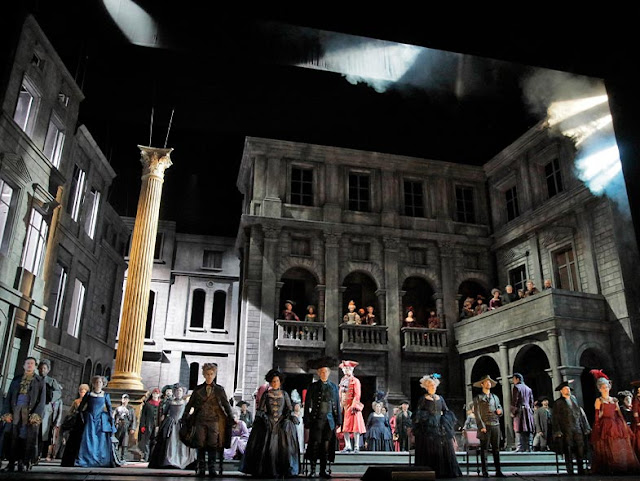Metropolitan Opera (live broadcast), 23/03/2024
Gounod : Roméo et Juliette
Chorus and Orchestra of the Metropolitan Opera, New York
Yannick Nézet-Séguin
This is a very handsome production of Roméo et Juliette, a single monumental set depicting a small square of 18th Century design in an Italian city, with a central dais, and balconies and colonnades aplenty, set beneath the windows of the Capulets' palazzo. During the interval, the director, Bartlett Sher, mentioned that the design was influenced by Fellini's Casanova, which is no doubt why I thought the set looked a little more like Venice than Verona, but it's a trivial point. The only scenes that were a bit less successful, given the large, open setting, were Juliet's bedroom, and Friar Laurence's chapel, both of which were represented somewhat incongruously. The crypt, however, was surprisingly effective, aided by intelligent lighting. Add to that a plethora of beautiful costumes, and you had something that was very easy on the eye indeed.
 |
| Roméo et Juliette, Prologue Metropolitan Opera, New York (© Metropolitan Opera, 2024) |
Apart from updating it by a couple of hundred years, Sher's production is quite straightforward, everything happens pretty much as and when you would expect, and there are no special insights into the characters offered. Everything therefore rests on the shoulders of the performers, and the Met served us well with this high-quality cast, with a particularly fine titular couple at its heart.
Nadine Sierra's tone is perhaps a trifle opulent to make her sound truly girlish, like the teenager Juliet is supposed to be, but the energy and vibrancy of her performance more than compensated for it, and the sensuality she brought to it had an instinctive quality that was very persuasive. This was a Juliet flying high on emotion and life, and the voyage between the bright and fresh "Je veux vivre" in Act 1 to the searing "Amour, ranime mon courage" in Act 4 (which was absolutely magnificently delivered) was passionately conveyed. Beside her, Benjamin Bernheim was a dreamer of a Roméo, to whom everything was new and astonishing, but which brought joy and pain in equal measures. He has the ideal timbre for this role, limpid and silken, but not overly Italianate, and a very elegant delivery, and his somewhat leaner sound complemented the fullness of Serra's timbre perfectly. The coherence of their vocal partnership was matched by the physical chemistry, this was a pair of young lovers in whom you could believe.
The title roles consume the great majority of the solo singing in this opera, especially with the four, ever-intensifying duets that mark their trajectory. However, that does not mean the secondary parts can be neglected, and nor were they. Samantha Hankey delivered an excellent Stéphano, despite it being the most irritating character on stage because, let's face it, that whole debacle of the end of Act 3, culminating in the death of Tybalt, is entirely Stéphano's fault! Eve Gigliotti was a perky Gertrude, while Alfred Walker was a sympathetic Friar Lawrence. Will Liverman (Mercutio) and Frederick Ballentine (Tybalt) were both firecrackers, Liverman perhaps a little less than youthful-sounding, with this richly bronzed baritone voice, but Ballentine clarion-bright as the hot-headed Tybalt. Cast and chorus were supported by the Met orchestra at its glorious best, with all the affection Yannick Nézert-Séguin has for the score appearing in the loving detail and the sumptuous tone quality of the playing, which was a joy to hear from start to finish.
[Next : 9th April]
